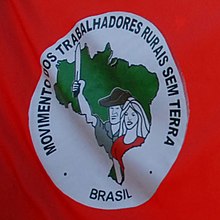| Movimento dos Trabalhadores Rurais Sem Terra | |
 | |
| Formation | January 1984 |
|---|---|
| Legal status | Social movement |
| Purpose | Agrarian land reform |
| Services | Land reform movement, squatting (primary); basic healthcare and education (secondary) |
Membership | 1,500,000 |
| Leader | João Pedro Stédile |
Main organ | Núcleo de Base |
Parent organization | National Coordination Body |
| Website | https://mst.org.br |

The Landless Workers' Movement (Portuguese: Movimento dos Trabalhadores Rurais Sem Terra, MST) is a social movement in Brazil aimed at land reform. Inspired by Marxism,[1] it is the largest such movement[2] in Latin America, with an estimated informal membership of 1.5 million[3] across 23 of Brazil's 26 states.[4]
MST defines its goals as access to the land for poor workers through land reform in Brazil, and activism around social issues that make land ownership more difficult to achieve, such as unequal income distribution, racism, sexism, and media monopolies.[5] MST strives to achieve a self-sustainable way of life for the rural poor.[6]
The MST differs from previous land reform movements in its single-issue focus; land reform for them is a self-justifying cause. The organization maintains that it is legally justified in occupying unproductive land, pointing to the most recent[when?] Constitution of Brazil (1988), which contains a passage saying that land must fulfill a social function (Article 5, XXIII). The MST also notes, based on 1996 census statistics, that a mere 3% of the population owns two-thirds of all arable land in Brazil.[7]
In 1991, MST received the Right Livelihood Award "for winning land for landless families, and helping them to farm it sustainably."[8]
- ^ Feix, Plínio José (2012). "O Pensamento Marxista no Projeto Político dos Dirigentes do MST" (PDF). Universidade de Campinas (UNICAMP). Archived (PDF) from the original on 16 April 2016. Retrieved 10 November 2017.
- ^ Anders Corr, No trespassing!: squatting, rent strikes, and land struggles worldwide. New York: South End Press, 1999, ISBN 0-89608-595-3, page 146 in 2007
- ^ Herbert Girardet, ed. Surviving the century: facing climate chaos and other global challenges. London, Earthscan, 2007, ISBN 978-1-84407-458-7, page 185
- ^ Dave Hill & Ravi Kumar, eds., Global neoliberalism and education and its consequences. New York: Routledge, 2009, ISBN 978-0-415-95774-8, page 146
- ^ "Nossos objetivos". MST page, "Nossos Objetivos | MST - Movimento dos Trabalhadores Sem Terra". Archived from the original on 2 September 2012. Retrieved 1 September 2012.. Retrieved September 1, 2012
- ^ James, Deborah (2007). Gaining Ground? Rights and Property in South African Land Reform. New York, New York: Routledge Cavendish. pp. 148–149. ISBN 978-0-415-42031-0.
- ^ About the MST Archived 2019-06-27 at the Wayback Machine on mstbrazil.org. Accessed September 9, 2006.
- ^ "Movimento dos Trabalhadores Rurais sem Terra (MST)". The Right Livelihood Award. Archived from the original on 24 August 2018. Retrieved 8 January 2020.